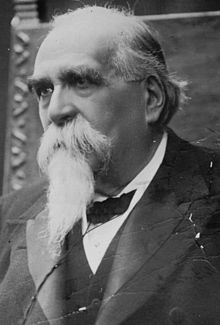Gianbattista Della Verde
This article is incomplete because it is pending further input from participants, or it is a work-in-progress by one author. Please comment on this article's talk page to share your input, comments and questions. Note: To contribute to this article, you may need to seek help from the author(s) of this page. |
Gianbattista Della Verde | |
|---|---|
 | |
| 20th Prime Minister of Atresca | |
| In office 26 March 1894 – 7 October 1902 | |
| Monarch | Apollo I (1894–1900) Apollo II (1900–1902 |
| Preceded by | Laurentino Palmeri |
| Succeeded by | Adamo Veratti |
| Member of the Atrescan Senate | |
| In office 17 October 1889 – 2 March 1904 | |
| Preceded by | Isaia De Rossi |
| Succeeded by | Franco Allesi |
| Constituency | San Victore |
| Personal details | |
| Born | October 13, 1833 Sannat, Colony of Aramas, Atresca |
| Died | February 14, 1929 (aged 95) Albasini, Atresca |
| Political party | Apollistas |
| Domestic partner | Maria Scutari (m. 1858) |
| Relations | 4 |
Gianbattista Della Verde, Marquess of Tosca OCB, ML (13 October 1833 – 14 February 1929; aged 95), often referred to as GDV, was an Atrescan jurist and politician who served as the 20th Prime Minister of Atresca between 1894 and 1902. Della Verde was Atresca's primary wartime leader, and was a large backer of the Riconciliazione, a series of events of rapprochement between Atresca and Midrasia in the leadup to the war.
Della Verde was born in 1833 to a noble family of Tosca, a small region of Callura-Friola, in the city of Sannat, the capital of the Atrescan Aramas colony. His father was a soldier and later lawyer, and influenced Della Verde's career in law heavily, although he never chose to serve in the military. Graduating from the Royal College Albasini in 1854 with a degree in law, Della Verde relocated to Monte Sora, where he became an influential lawyer. He married lifelong wife Maria Scutari in 1858 in the city and was chosen as one of Apollo's principal law advisors in 1868, inheriting his father's title in the same year upon his death. Becoming notable for his quick wit and liberal politics, Della Verde entered politics in 1889, being elected to the Atrescan Senate for the district of San Victore in Albasini, aged 66. Quickly becoming a leader of the classical liberal Apollistas faction, Della Verde's successful 1894 bid for the Prime Minister position saw him elected into the role as a backer of the Atrescan-Midrasian axis against the Veleazan Empire and the United Kingdom of Lhedwin.
When war broke on in Asura in 1895, Della Verde's prior mobilisation with the expectation of war saw Atresca score quick victories on the Arabekhi front against the Entente powers, with Atresca occupying most of colonial Arabekh by 1898. A major naval power, Atresca provided naval support to Midrasia in the Asur Sea, and also participated on the naval front against Lhedwin, preventing their fleets from entering the Asur through the Strait of Troping. Della Verde's birthplace saw increased focus on Arabakh's manpower and natural supplies for the Atrescan war effort, with Sannat benefitting from wartime migration. Della Verde attended the Millennium Peace Accords in 1900, and was a signatory of the treaty that ended the war. He continued to serve as Prime Minister until 1902, mainly sponsoring and implementing policies and post-war recovery in Atresca, before being replaced by Atrescan Labour politician Adamo Veratti in the 1902 election. He continued to serve in the Senate until 1904 when he announced his retirement from politics, passing in his home in Albasini in 1929, aged 95.
Della Verde is often praised for his policies of reconciliation, with Apollo I declaring him "the man who won the war" in 1900. He was granted the Order of the Blue Crown and the Medal of Ludovico by Apollo II in 1901 for his wartime leadership, and is commended for his role in the foundation of the Grand Alliance. He is also criticised by many Arabekhi politicians for his attitude towards the conscription of Arabekhi peoples under Atrescan colonial rule, with an estimated 360,000 serving throughout the war and 100,000 of those losing their lives in it.